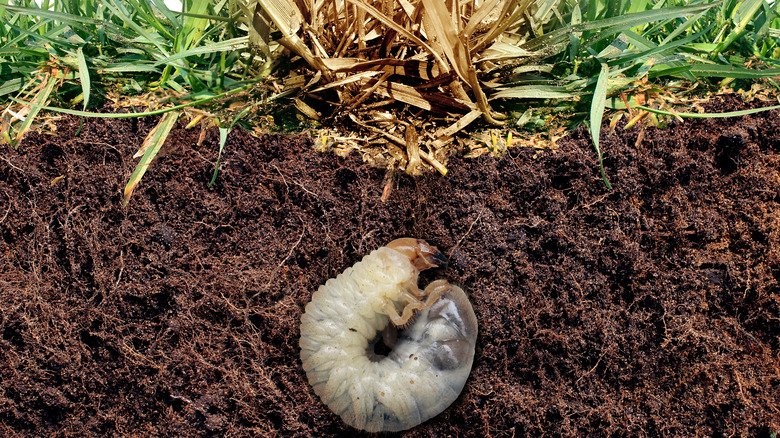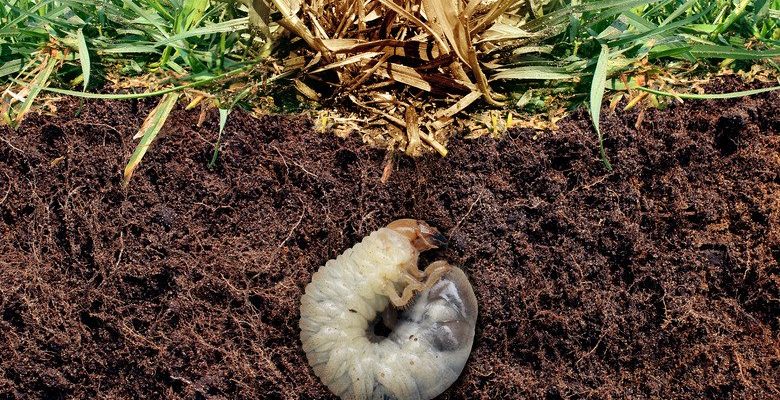
Composting is a fantastic way to recycle kitchen scraps and yard waste, turning them into nutrient-rich soil. But when it comes to soil infected with grub worms, things can get a bit tricky. Grub worms, which are the larval stage of various beetles, can damage your garden plants, raising concerns about composting. You might be wondering if they’ll turn your compost pile into a haven for pests or if they could contribute to healthy soil. Let’s dig in and find out!
What Are Grub Worms?
Grub worms, often referred to just as grubs, are the larvae of beetles like Japanese beetles or June bugs. They typically have a C-shaped body, are white, and can range from about half an inch to several inches in length, depending on their species and stage of development. As they munch on organic matter, they can also feast on the roots of your plants, leading to damage.
Here’s where things get intriguing—grubs are not all bad. In healthy ecosystems, they serve as food for birds and other wildlife. However, if you find them in your soil in large numbers, they can wreak havoc, especially in your garden. Think of them as unexpected guests at a dinner party. A few might be charming, but too many can lead to disaster!
Can You Compost Infected Soil?
The short answer is yes, you can compost soil infected with grub worms, but with a few conditions. Composting this soil might actually reduce the grub population over time, but it’s essential to ensure that your composting process reaches the right temperatures. Hot composting, which maintains a temperature between 130°F to 160°F, can kill off harmful pests and pathogens, including those pesky grubs.
When you consider adding infected soil to your compost, think about balancing it with plenty of green materials, like kitchen scraps, grass clippings, or green leaves. These materials provide the nitrogen necessary to fuel the composting process. It’s all about creating that perfect recipe for healthy compost!
How to Safely Compost Soil with Grubs
If you’re determined to compost soil infected with grubs, follow these steps for a successful outcome:
- Assess the infestation: Before adding the soil to your compost pile, take a good look. If there are too many grubs, consider reducing the quantity of soil to just a small portion.
- Create a hot compost pile: Ensure your compost pile is well-aerated and reaches the required temperature. Maintain a good mix of brown (carbon-rich) and green (nitrogen-rich) materials. You want your pile to be a lively mix!
- Turn the pile regularly: Turning your compost helps aerate it, promoting microbial activity and higher temperatures that can eliminate grubs. Aim to turn it every week or so.
- Monitor the compost: Keep an eye on the temperature and moisture levels. If it drops too low, consider adding more green materials or turning it again.
By following these steps, you can transform your grit into gold—or rather, healthy compost!
The Benefits of Composting
You might be wondering, “Why should I bother composting my soil infected with grubs?” Well, there are plenty of benefits! First, composting helps reduce waste that would otherwise end up in landfills. Second, it enriches your garden soil with nutrients, improving its structure and ability to retain moisture. Plus, it encourages beneficial microorganisms that can help fight pests and diseases.
Here’s a fun fact: healthy soil can naturally suppress pests and diseases. So, by composting, you’re effectively making your garden a happier, healthier place. It’s like nurturing a neighborhood where everyone thrives!
Alternatives to Composting Infected Soil
If composting soil with grubs feels like a gamble, several alternatives can help manage the situation:
- Solarization: You can spread the infected soil in a thin layer on a tarp under direct sunlight. Cover it with clear plastic to trap heat, which can help to kill off grubs over time.
- Beneficial nematodes: These microscopically small organisms can be introduced into your soil. They prey on grubs, helping to control their population naturally.
- Crop rotation: Changing your planting strategy can prevent grubs from becoming established. Planting different crops in different areas of your garden disrupts their life cycle.
These methods can help you manage grubs without the need to incorporate infected soil into your compost.
When Not to Compost Soil with Grubs
While it seems manageable, there are times when composting soil infected with grubs isn’t the best idea. If the infestation is severe and the grubs are causing significant damage, it may be better to dispose of the soil entirely. Additionally, if the grubs are accompanied by other pests or diseases, it’s safer to keep that soil out of your compost.
Remember that your compost pile is a haven for beneficial organisms. Keeping it healthy means being cautious about what you add!
So, can you compost soil infected with grub worms? The answer is yes, but with care and awareness of the potential risks. A hot composting method can help ensure that those pesky grubs don’t become a problem in your nutrient-rich compost. Think of composting as a cycle of renewal—you’re taking something challenging, like infected soil, and turning it into something productive.
As you embark on your composting journey, remember to assess the situation, manage your compost temperatures, and provide the right balance of materials. With a little effort, you can transform that grub-infested soil into a treasure trove of nutrient-rich compost for your garden. Happy composting, and may your garden thrive!

